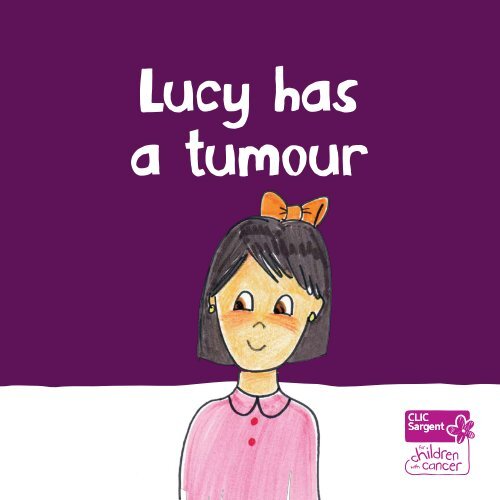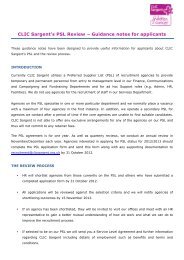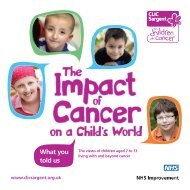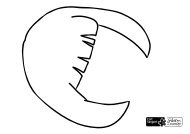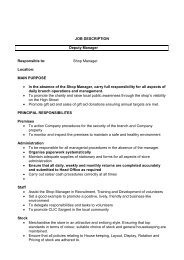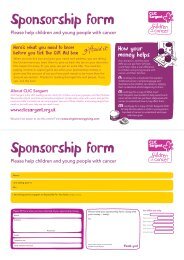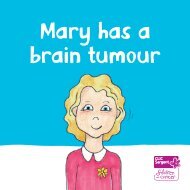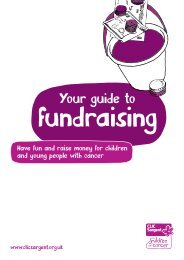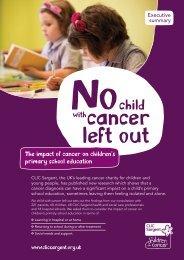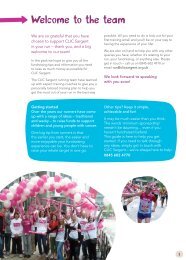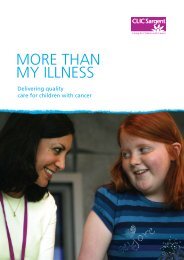Lucy has a tumour - CLIC Sargent
Lucy has a tumour - CLIC Sargent
Lucy has a tumour - CLIC Sargent
You also want an ePaper? Increase the reach of your titles
YUMPU automatically turns print PDFs into web optimized ePapers that Google loves.
<strong>Lucy</strong> <strong>has</strong><br />
a <strong>tumour</strong>
<strong>Lucy</strong> <strong>has</strong> a <strong>tumour</strong> is a storybook written especially for parents<br />
and carers to read with children to help them understand what<br />
cancer is and the treatment it involves.<br />
At the back of the book you will find a useful glossary of difficult<br />
words you will come across when dealing with doctors and hospitals.<br />
<strong>CLIC</strong> <strong>Sargent</strong> is the UK’s leading cancer<br />
charity for children and young people, and<br />
their families. We provide clinical, practical<br />
and emotional support to help them cope<br />
with cancer and get the most out of life.
<strong>Lucy</strong> <strong>has</strong><br />
a <strong>tumour</strong><br />
By Victoria Barton<br />
Medical reviewers for this edition: Dr Anna Jenkins and Dr Dan Yeomanson,<br />
Consultant Paediatric Oncologists<br />
Illustration by<br />
Tony Harris<br />
This book belongs to..............................................................................
This is <strong>Lucy</strong>. She is five years old and lives with her mum and<br />
brother Harry who is nine. <strong>Lucy</strong>’s dad does not live with them,<br />
but they see him regularly.<br />
<strong>Lucy</strong> <strong>has</strong> lots of things she enjoys. She loves running,<br />
skipping, and doing cartwheels, but most of all she likes<br />
to play with her best friend<br />
Leyla and her two kittens,<br />
Smudge and Bertie.<br />
1
One morning, just as everyone was getting ready for school,<br />
<strong>Lucy</strong> told her mum that her tummy was hurting and she felt<br />
really unwell. Dad came round to take Harry to school and<br />
Mum stayed with <strong>Lucy</strong>. <strong>Lucy</strong> began to feel better after a while<br />
and managed to get into school at lunchtime, but the next day<br />
she woke up feeling poorly again.<br />
2
<strong>Lucy</strong> and her mum went to see the doctor to see why <strong>Lucy</strong>’s<br />
tummy kept hurting. The doctor gave her some medicine but<br />
it did not seem to work and after a few days he sent <strong>Lucy</strong> to<br />
the hospital to see if they knew what was wrong.<br />
3
The hospital doctor said that they needed to find out why<br />
<strong>Lucy</strong> was so ill and she would have to stay on the children’s<br />
ward for a few days for tests. There were other children on<br />
the ward and her mum was able to stay with her while her<br />
dad looked after Harry and visited each day.<br />
<strong>Lucy</strong> had to have some special tests at the hospital; some<br />
were blood tests and one of them was a scan. She had to lie<br />
very still for quite a long time while the scanner took pictures<br />
of the inside of her body. It did not hurt a bit and <strong>Lucy</strong> was<br />
very good at keeping still.<br />
4
After a few days the doctor<br />
saw <strong>Lucy</strong>, her mum and<br />
dad. He explained that<br />
the pictures showed that<br />
<strong>Lucy</strong> had a lump inside her<br />
tummy, and this was why<br />
her tummy hurt. The doctor<br />
said the lump was called a <strong>tumour</strong> and was a type of cancer.<br />
“What is cancer” <strong>Lucy</strong> asked.<br />
* Words in italics are explained under ‘What these words mean’ at the back of this book.<br />
6
The doctor explained that “Everyone’s body is made up of<br />
millions of tiny cells, so tiny you cannot see them without<br />
a microscope. These cells go to make different things our<br />
bodies need – like blood,<br />
muscle or bone.<br />
Sometimes the cells start to<br />
divide up to make new cells too<br />
Damaged cells<br />
7<br />
Healthy cells<br />
quickly and do not do their job properly. Lots of damaged cells<br />
are made and they stop the good cells from working properly.<br />
This is called cancer. When the damaged cells do not know what<br />
they should do they begin to stick<br />
together to form a lump. This is<br />
called a <strong>tumour</strong>. There are lots of<br />
different kinds of cancer.”
To decide on the best treatment for <strong>Lucy</strong> she needed a small<br />
operation, called a biopsy, so that the doctor could look at a<br />
tiny sample of the <strong>tumour</strong> under a microscope.<br />
8
The next day Harry came to see <strong>Lucy</strong> and he was able to play with<br />
her and some of the other children. The ward had lots of toys and a<br />
computer, there was lots to do even if you did not feel well enough<br />
to get out of bed.<br />
9
It can take a few days for the doctors to get the results of all<br />
the tests, so when <strong>Lucy</strong> was well enough she went home.<br />
Harry was really pleased <strong>Lucy</strong> was back home, but she got<br />
lots of presents and he felt left out. Mum and Dad soon<br />
realised that everyone was making a fuss of <strong>Lucy</strong> and made<br />
sure that Harry was always included.<br />
“After all,” Dad said, “Harry<br />
and I have had a hard time<br />
too and missed them<br />
both when they were<br />
at the hospital.”<br />
10
Soon <strong>Lucy</strong> had to go back to the hospital to see what the tests<br />
showed. Mum and <strong>Lucy</strong> met the doctor who explained that <strong>Lucy</strong><br />
would need to have some medicines called chemotherapy. She<br />
might also need to have an operation and possibly some other<br />
treatment, called radiotherapy, later on.<br />
11
He explained that with chemotherapy<br />
some would be tablets and some<br />
would be medicine that would go<br />
through a central line. There are<br />
different types of central lines – a<br />
broviac, a portacath and a Hickman<br />
line. Often the line is called a<br />
Wiggly! The treatment would take<br />
some months but she would not<br />
be in hospital all the time.<br />
12
Soon it was time to go back to the hospital and start her<br />
treatment. The chemotherapy went through the special ‘wiggly<br />
line’ that <strong>Lucy</strong> had in her chest. It did not hurt but sometimes<br />
made her feel a bit funny. When the chemotherapy had finished<br />
the machine bleeped!<br />
13
As a result of the chemotherapy<br />
<strong>Lucy</strong>’s hair began to fall out, just like<br />
Dad had said it would. Even though<br />
he had explained that it would not<br />
hurt when her hair fell out, <strong>Lucy</strong> had<br />
not really believed him. But he was<br />
right. Dad also said that <strong>Lucy</strong>’s hair<br />
would grow back when she had<br />
finished her treatment.<br />
<strong>Lucy</strong> thought she would wear a cap<br />
or scarf if she got cold.<br />
14
At the clinic <strong>Lucy</strong> saw lots of other boys and girls, some of<br />
the girls had wigs, some wore hats or caps or scarves, and<br />
some already had their own hair again. They often talked and<br />
played together.<br />
15
<strong>Lucy</strong> had lots of chemotherapy to try to shrink the <strong>tumour</strong>.<br />
It took a long time but after each course she was able to go<br />
home. Sometimes she felt sick, and sometimes she got an<br />
infection – she would get a temperature and not feel well.<br />
When this happened she had to go to hospital for special<br />
medicine. Once she had to have a blood transfusion to help<br />
her have more energy. The new blood went down the wiggly<br />
line so it did not hurt and it made her feel better.<br />
<strong>Lucy</strong> quite liked being on the ward as the play specialists and<br />
teachers helped her to make things when she felt well enough.<br />
<strong>Lucy</strong> made friends with a boy called Joe who had leukaemia<br />
and a girl called Sarah who had a <strong>tumour</strong> in her leg.<br />
17
There was a boy called Imran who had to stay in his room<br />
because he was having a bone marrow transplant – everyone<br />
had to wave to him through his window. Imran had to stay in his<br />
room until his bone marrow started to work properly.<br />
18
One day <strong>Lucy</strong> saw Joe come to the<br />
ward, but he was not allowed to play<br />
with anyone. <strong>Lucy</strong> asked one of the<br />
nurses why she could not go and see<br />
him. She was told that Joe had come for<br />
some special medicine to help stop<br />
him catching chickenpox from<br />
his friend at school who had<br />
woken up one morning with<br />
spots all over his body. Children<br />
who are having chemotherapy<br />
can be very unwell if they catch<br />
chickenpox or measles, so if they meet someone who <strong>has</strong> it,<br />
they should tell their doctor as they might have to go to hospital.<br />
19
The doctor told <strong>Lucy</strong> that the chemotherapy had made the<br />
<strong>tumour</strong> smaller and she would now have an operation to<br />
take it out.<br />
The doctor was happy for Mum or Dad to be with <strong>Lucy</strong><br />
until she had her anaesthetic and they would be by her bed<br />
when she woke up.<br />
While <strong>Lucy</strong> was getting better Mum, Dad and Grandad<br />
came to read her stories and she was given lots of cuddles.<br />
The doctors and nurses were very kind and answered any<br />
questions that they had.<br />
20
Some time after <strong>Lucy</strong> had her operation she was able to go<br />
home for a little while. <strong>Lucy</strong> was beginning to feel better<br />
and was able to play with Harry and her friend Leyla, but she<br />
was not well enough to play with the kittens and she really<br />
missed that.<br />
22
Sometimes <strong>Lucy</strong> felt well enough to go to school for a little<br />
while and see her friends. When she was not well enough<br />
for school, Mrs Johns, a teacher, came and gave her lessons<br />
at home.<br />
<strong>Lucy</strong> really enjoyed<br />
that. Mum said the<br />
lessons would help<br />
her to keep up with<br />
the work her friends<br />
were doing in school.<br />
23
After her operation <strong>Lucy</strong> had more tests and her doctor said<br />
she needed to have radiotherapy. He told <strong>Lucy</strong> that she<br />
might get very tired and she would probably have to miss<br />
more school.<br />
<strong>Lucy</strong> did not mind the radiotherapy, it was like being in<br />
a space ship where she had to stay very still. The doctor<br />
helped <strong>Lucy</strong> get on a special bed that moved up and down<br />
and she had lines drawn on her tummy to show where the<br />
rays should go to make her better.<br />
After a while all <strong>Lucy</strong>’s treatment had finished and soon her<br />
line would be taken out. The doctor said she would only<br />
need to come to the hospital for check-ups and tests to<br />
make sure she was growing properly and keeping well.<br />
24
Harry helped Mum and Dad to arrange a surprise party for<br />
<strong>Lucy</strong>. All her friends came and although she was not quite<br />
well enough to do cartwheels <strong>Lucy</strong> had a wonderful time.<br />
The biggest surprise was a little kitten all of her own...<br />
26
...What do you think she called her Wiggly!<br />
27
What these words mean<br />
You may hear lots of strange new words when you’re in hospital. Below we<br />
explain what some of them mean. If you’re unsure about any others, just ask<br />
your doctor or nurse.<br />
BIOPSY<br />
When a piece of the <strong>tumour</strong> is taken out and looked at under a microscope.<br />
BLOOD TEST<br />
When a tiny sample of your blood is looked at to see how many red cells, white<br />
cells and platelets you have (this is called a full blood count or FBC).<br />
BLOOD/PLATELET TRANSFUSION<br />
When your blood count is low you may need extra blood to help you feel better.<br />
BONE MARROW TRANSPLANT<br />
When you are given a new set of blood-forming cells which then produce<br />
healthy new red and white cells.<br />
BROVIAC<br />
One or two lines are inserted in a vein under anaesthetic, the end comes out of<br />
a small hole in your skin on your chest.<br />
28
What these words mean<br />
CANCER<br />
When the cells in your body become abnormal (bad) and continue to grow<br />
on their own, out of control.<br />
CHEMOTHERAPY<br />
A mixture of different medicines which treat cancer.<br />
HICKMAN LINE<br />
A long plastic tube inserted into one of the big veins (blood vessels) in your<br />
body, usually your neck. The end comes out through a small hole in the skin<br />
on your chest. This is inserted under general anaesthetic.<br />
LEUKAEMIA<br />
A form of cancer when the factory that makes your blood is not<br />
working properly.<br />
OPERATION<br />
Where you have some medicine called anaesthetic to make you have a<br />
special sleep and then the doctors can have a look at your body without<br />
hurting you.<br />
29
What these words mean<br />
PORTACATH<br />
A device, or bobble, is inserted under the skin near the armpit under<br />
general anaesthetic and a very thin tube (the line) then runs under the skin<br />
to the main vein in the neck. If treatment is given or blood taken, ‘magic<br />
cream’ is put on to the skin covering the bobble beforehand – to make it<br />
go numb so it will not hurt so much when the needle goes in.<br />
RADIOTHERAPY<br />
Is where very special rays are pointed at the <strong>tumour</strong>. The job of the rays is<br />
to try to get rid of even the tiniest scrap of <strong>tumour</strong> that might be left after<br />
the operation and chemotherapy.<br />
30
Do you have any questions,<br />
or need some help<br />
<strong>CLIC</strong> <strong>Sargent</strong> is the UK’s leading cancer charity for<br />
children and young people, and their families. We<br />
provide clinical, practical and emotional support to<br />
help them cope with cancer and get the most out of<br />
life. Talk to your <strong>CLIC</strong> <strong>Sargent</strong> care professional, or<br />
call us on 0300 330 0803 and we’ll put you in touch<br />
with someone who can help.<br />
You can also visit our website at<br />
www.clicsargent.org.uk<br />
or email us at info@clicsargent.org.uk<br />
Please note that everyone’s experience will be different and may not follow the order outlined here. Services will differ<br />
across the UK. <strong>CLIC</strong> <strong>Sargent</strong> does not accept any responsibility for information and services provided by third parties,<br />
including those referred to or signposted to in this publication.<br />
We endeavour to ensure that the information provided is accurate and up-to-date at time of printing. <strong>CLIC</strong> <strong>Sargent</strong><br />
cannot accept liability for any loss or damage resulting from any inaccuracy or omission in this publication. Information<br />
in this publication should not be relied on in place of appropriate professional advice specific to your circumstances.<br />
www.clicsargent.org.uk<br />
Registered charity number 1107328 and registered in Scotland (SC039857)<br />
31
Ref: SER013_11459<br />
Version: 2, February 2012<br />
Next planned review: 2014<br />
For information about the sources used to put this<br />
publication together, or if you have any comments or<br />
queries about it, please contact us on 0300 330 0803<br />
and ask to speak to the Information Manager.


